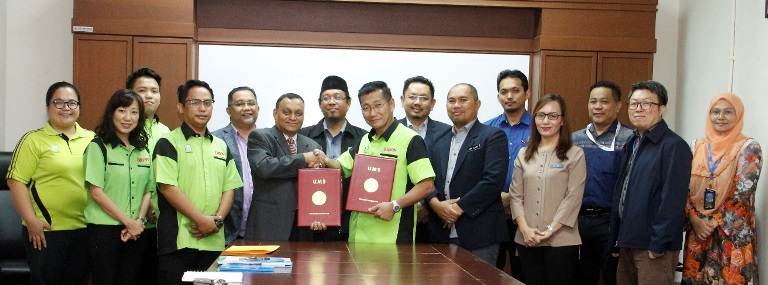
JUMAAT, 22 MAC - Fakulti Kejuruteraan (FKJ) Universiti Malaysia Sabah (UMS), menandatangani Surat Niat (LoI) dengan Exorin Technologies Sdn. Bhd. di FKJ, baru-baru ini.
Melalui kerjasama itu, enam buah bas UMS akan digunakan untuk menguji kecekapan produk Exorin bagi mengurangkan pelepasan ekzos berbahaya dan asap hitam seperti karbon monoksida, hidrokarbon dan pelepasan karbon hitam yang merupakan pencemar utama pelepasan diesel.
Dekan Fakulti Kejuruteraan UMS, Prof. Ir. Dr. Abdul Karim Mirasa berkata, LoI itu akan menjadi peluang terbaik untuk UMS untuk belajar tentang industri hijau, dan menggunakan teknologi ini untuk menjadi penghubung kepada industri.
"UMS dan pasukan Exorin bekerja keras untuk menjadikan teknologi ini tersedia untuk semua orang dalam bentuk produk yang cepat, mudah dan pantas agar semua pihak dapat memainkan peranan untuk berkongsi tanggungjawab global dalam menjaga alam sekitar.
“Teknologi ini akan menjadi sebuah penyelesaian untuk memerangi pencemaran yang semakin meningkat dan mengurangi perubahan iklim,” katanya dalam satu kenyataan semalam.
Menurut Prof. Ir. Dr. Kasim, teknologi itu berpotensi untuk menjimatkan kos kepada industri tempatan ke arah industri berkarbon rendah.
Sementara itu, Pengasas dan Pengarah Urusan Exorin Technologies Sdn. Bhd, Clement Lee Nyuk Yin berkata teknologi yang dihasilkan syarikat itu terbukti berfungsi pada setiap enjin diesel.
“Sekarang dengan para pakar UMS untuk meningkatkan dengan formulasi, kami mengambil kesempatan ini untuk meminta setiap industri Malaysia memberi peluang kepada produk tempatan Sabah untuk menghasilkan dan mengeluarkan produk ini.
“Tujuan Exorin adalah untuk memelihara alam sekitar dan untuk generasi akan datang,” katanya.
Hadir sama, Timbalan Dekan (Penyelidikan dan Inovasi) FKJ UMS, Dr. Abu Zahrim Yaser.



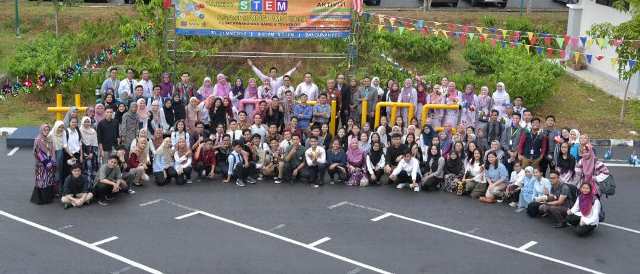 JUMAAT, 22 MAC - Pusat Persediaan Sains dan Teknologi (PPST) Universiti Malaysia Sabah (UMS) bersedia meningkatkan kemasukan pelajar terutamanya dalam bidang sains dan teknologi.
JUMAAT, 22 MAC - Pusat Persediaan Sains dan Teknologi (PPST) Universiti Malaysia Sabah (UMS) bersedia meningkatkan kemasukan pelajar terutamanya dalam bidang sains dan teknologi.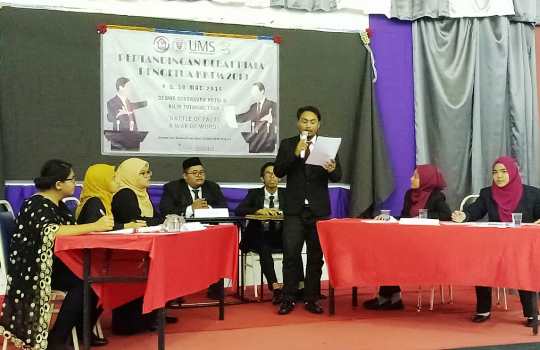 KHAMIS, 21 MAC - Demi United dari Kolej Kediaman Tun Mustapha (KKTM) Universiti Malaysia Sabah (UMS) diumumkan sebagai johan pertandingan Debat Piala Pengetua KKTM 2019 yang berlangsung di dewan serbaguna kolej kediaman itu, baru-baru ini.
KHAMIS, 21 MAC - Demi United dari Kolej Kediaman Tun Mustapha (KKTM) Universiti Malaysia Sabah (UMS) diumumkan sebagai johan pertandingan Debat Piala Pengetua KKTM 2019 yang berlangsung di dewan serbaguna kolej kediaman itu, baru-baru ini.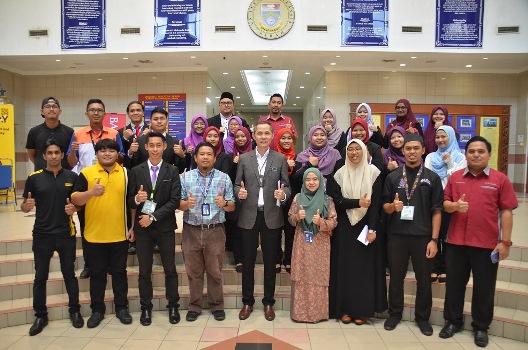 RABU, 20 MAC - Program Minggu Kewangan Islam merupakan sebuah program yang berobjektifkan untuk memberi pendedahan kepada semua mahasiswa UMS Kampus Antarabangsa Labuan (UMSKAL) dan warga Labuan mengenai kewangan Islam.
RABU, 20 MAC - Program Minggu Kewangan Islam merupakan sebuah program yang berobjektifkan untuk memberi pendedahan kepada semua mahasiswa UMS Kampus Antarabangsa Labuan (UMSKAL) dan warga Labuan mengenai kewangan Islam.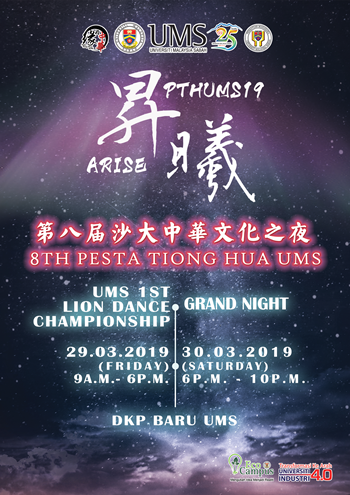 SELASA, 19 MAC - Malam Kemuncak Pesta Tiong Hua Universiti Malaysia Sabah 2019 (PTHUMS19) akan berlangsung pada 30 Mac 2019 di Kompleks Dewan Kuliah Pusat Ke-2, UMS.
SELASA, 19 MAC - Malam Kemuncak Pesta Tiong Hua Universiti Malaysia Sabah 2019 (PTHUMS19) akan berlangsung pada 30 Mac 2019 di Kompleks Dewan Kuliah Pusat Ke-2, UMS.